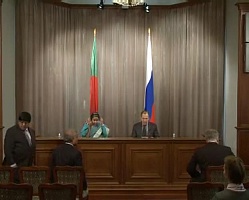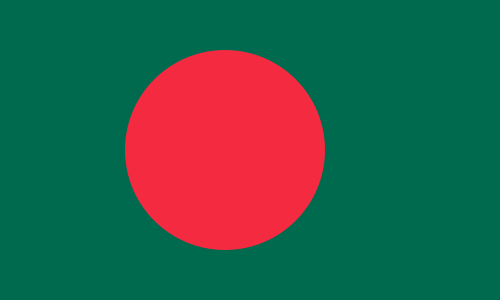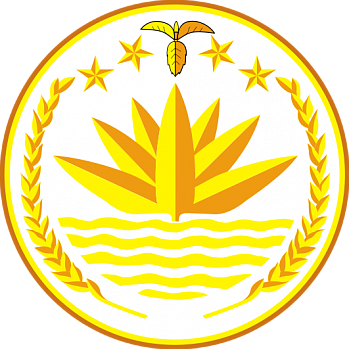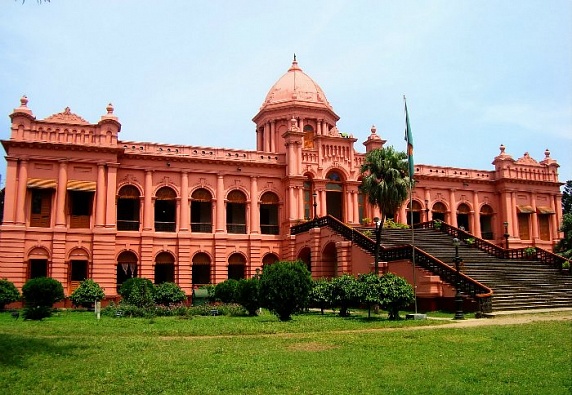 Народная Республика Бангладеш
Народная Республика Бангладеш
Remarks and Replies by Russian Foreign Minister Sergey Lavrov to Media Questions at Joint Press Conference Following Talks with Bangladesh Foreign Minister Dipu Moni, Moscow, April 6, 2011
Dear members of the media,
Today, Minister of Foreign Affairs of the People's Republic of Bangladesh, Mrs. Dipu Moni, and I discussed many issues that concern international problems and the regional agenda and, of course, our bilateral relations.
In the bilateral sphere we noted the very positive momentum, both in terms of the development of political dialogue and from the viewpoint of prospects for economic, trade and investment cooperation, including the realization of a number of large-scale projects. Next year marks the 40th anniversary of the establishment of diplomatic relations between our countries. We discussed plans of contacts at various levels meant to impart additional impulse to the further strengthening of traditionally friendly ties between Russia and Bangladesh.
In questions of bilateral cooperation we paid special attention to such areas as energy, the oil and gas sector, agriculture and further streamlining of the legal framework. A whole array of documents is in the works, including an agreement on cooperation to build a nuclear power station in Bangladesh. The text of the agreement was already initialed in February this year; we will be preparing it for signature.
From the international agenda I will highlight what's most important – we hold similar positions on the chief problems of the contemporary world. This concerns the need to strictly respect international law and the strengthening of the central role of the UN in dealing with international and regional problems and the settlement of conflicts by peaceful political means. We decided to undertake additional steps to concretize and enhance the effectiveness of bilateral cooperation in the field of combating international terrorism and extremism, and agreed to strengthen the mechanisms of our collaboration.
From the Russian side we also expressed our deep appreciation for the constructive role Bangladesh plays in deepening the processes of integration in South Asia and in tackling the problems arising on the subcontinent in a spirit of good-neighborliness and solidarity. We believe that just such approaches are needed today in all regions of the world, especially with regard for the urgency of the task of promptly stabilizing the situations in the Middle East and in North Africa.
I think that today's talks have helped us advance in Russia-Bangladesh relations in all areas.
Question: How could you comment on the statement by the chief of staff for the Libyan Provisional Council that opposition forces are not happy with NATO's actions on the territory of Libya, in particular, that if the Alliance continues to act this way, without providing protection to civilians, they will have to again complain to the UN Security Council?
A second question concerns the situation in Yemen. The opposition and leadership of Yemen have agreed to hold talks with Gulf countries' mediation. This meeting is due to be held in Saudi Arabia. What is your attitude to the prospect of the Yemeni opposition and leadership sitting down at the negotiating table?
Sergey Lavrov: Like all responsible diplomats, I take a positive view of the fact that the opposition and leadership of Yemen will hold a meeting. We have always advocated that the problems in Yemen, in any other country of the region and indeed in other countries of the world should be addressed through dialogue. We were greatly concerned by the way events had been developing in Yemen and in a number of other states, but always encouraged the parties to sit down and discuss the existing problems. It is clear that reforms in most of those countries are overdue, there can be no delay on them and that people want more vigorous steps to tackle socioeconomic problems and to ensure political pluralism. But this needs to be spoken about by sitting at the negotiating table. This cannot be imposed by military force. Therefore, we expect that the Gulf Cooperation Council's mediation role will be taken advantage of and will lead to concrete results.
As to the question regarding Libya, we have heard the appeals of the opposition that NATO should support them more actively. If we are talking about the protection of civilians by those enforcing a no-fly zone, as, in fact, the Security Council resolution demands, it is one thing. But it is quite another thing if the appeals to NATO mean a request to provide military support to the insurgent forces. That would mean interference in a civil war, which the Security Council did not authorize. We want to understand what is behind those appeals and, of course, learn what the countries that have assumed responsibility for the fulfillment of the Security Council resolution think on that score.
Regarding the discussion of the Libyan problem in the UN Security Council, I can say that regardless of what appeals come from Benghazi or Tripoli, the Council must and will consider the Libyan theme on a regular basis. Firstly, by adopting resolution 1973, the Council approved the appropriate mandate which the NATO countries and a number of other states now use. They are obliged to report on the fulfillment of that mandate to the Security Council at its meetings. Secondly, the UN Secretary General has a special envoy to Libya who deals with both humanitarian and political issues of the present crisis. He is a former minister for foreign affairs of Jordan, Mr. Abdul Ilah al-Khatib. The day before yesterday, he presented his first impressions of his trip to Libya at a Council meeting. He must present such accounts regularly, and not just talk about the factual side of the matter – and here there are quite a few things which we would like to clear up – but also tell how he is fulfilling the instruction to help normalize the situation and have it develop along political lines.
Undoubtedly it would also be important for us all to know the position of the League of Arab States, which in fact asked the Security Council to impose a no-fly zone, and the position of the African Union (AU), which likewise adopted a number of concrete decisions on Libya, including the establishment of the Ad Hoc Committee made up of five African presidents, regarding the present development of the situation. The AU Committee intends to travel to Libya, visit both east and west and see how this Union, of which Libya is a member, can help stabilize the situation. So far the Committee cannot go there because of hostilities, but we consider absolutely just the Africans' appeal to those who enforce a no-fly zone to take necessary measures to create conditions for that trip.







